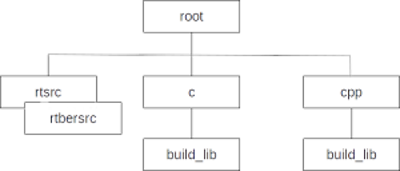The unlimited run-time source kits include ANSI-standard source code for the base run-time libraries. This code can be used to build binary versions of the run-time libraries for other operating environments. Included with the source code is a portable makefile that can be used to build the libraries on the target platform with minimal changes. All platform-specific items are isolated in the platform.mk file in the c/build_lib or cpp/build_lib directory of the installation.
The procedure to port the run-time code to a different platform uses a Perl script to compress the necessary files and is as follows (note: this assumes common UNIX or GNU compilation utilities are in place on the target platform):
-
Change to the scripts subdirectory in the current run-time installation.
-
Enter the following command: "perl port_runtime.pl [rootdirname]", where "rootdirname" is the name of the root directory to be used on the target platform. If rootdirname is not specified, the default name is "runtime_port". This will result in a compressed tar.gz file (if using Linux) or zip file (if using Windows).
-
Copy the compressed file to the target platform.
-
Uncompress the tar.gz or zip file on the target platform. This will result in a directory tree as follows:

-
If necessary, edit the platform.mk file in the c or cpp subdirectory and modify the compilation parameters to fit those of the compiler of the target system. In general, the following parameters will need to be adjusted:
-
CC: C compiler executable name (i.e. gcc) -
CCC: C++ compiler executable name (i.e. g++) -
CFLAGS_: Flags that should be specified on the C or C++ command line -
LIBCMD: Archive executable name (i.e. ar)
-
-
Invoke the makefile in the c/build_lib or cpp/build_lib subdirectory.
If the port_runtime.pl script is not available or Perl is not installed on the source system, perform the following steps to manually set up the target system build environment:
-
Create a directory tree containing a root directory (the name does not matter) and rt*src and c/build_lib or cpp/build_lib subdirectories (note: in these definitions, * is a wildcard character indicating there are multiple directories matching this pattern, such as rtbersrc or rtxsrc). The tree should look as shown in the picture above.
-
Copy all files from the different rt*src subdirectories from the installation to the rt*src directories on the target platform (note: if transferring from DOS to UNIX or vice-versa, FTP the files in ASCII mode to ensure lines are terminated properly).
-
Copy the platform.* files from the c or cpp subdirectory of the installation to the corresponding subdirectory on the target platform (note: if transferring from DOS to UNIX or vice-versa, FTP the files in ASCII mode to ensure lines are terminated properly).
-
Copy the makefile from the c/build_lib or cpp/build_lib subdirectory of the installation to the corresponding subdirectory on the target platform (note: if transferring from DOS to UNIX or vice-versa, FTP the files in ASCII mode to ensure lines are terminated properly).
-
If necessary, edit the platform.mk file in the c or cpp subdirectory and modify the compilation parameters to fit those of the compiler of the target system. In general, the following parameters will need to be adjusted:
-
CC: C compiler executable name (i.e. gcc) -
CCC: C++ compiler executable name (i.e. g++) -
CFLAGS_: Flags that should be specified on the C or C++ command line -
LIBCMD: Archive executable name (i.e. ar)
-
-
Invoke the makefile in the c/build_lib or cpp/build_lib subdirectory.
If all parameters were set up correctly, the result should be binary library files created in the c/lib or cpp/lib subdirectory (note: the lib subdirectory will be created as part of the build process if not already present).